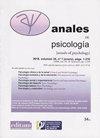Social and Emotional Loneliness among Older People Living in Nursing Homes in Spain: A Cross-Sectional Study
IF 1.3
4区 心理学
Q3 PSYCHOLOGY
引用次数: 1
Abstract
(1) Background: Loneliness, little studied in Nursing Homes (NHs), can affect physical and mental health. We aimed to verify the prevalence of loneliness in 5 NHs and its associated factors. (2) Methods: Cross-sectional study. Older adults aged 65 or over with preserved cognitive status were included. The De Jong Gierveld Loneliness Scale was used to assess overall, social, and emotional loneliness; sociodemographic and health-related variables were collected. The chi-square (or Fisher’s) test and logistic regression were used for bivariate and multivariate analysis respectively. (3) Results: The final sample consisted of 65 participants (81.5% female) with a mean age of 84±7.13. Prevalence of overall loneliness was 70.7% (95%CI:58.2-81.4), social loneliness 44.6% (95% CI: 33.1-56.6) and emotional loneliness 46.2% (95% CI: 34.5–58.1). Overall loneliness was associated with lower perceived quality of life (Odds Ratio-OR= 5.52, 95% CI:1.25-24.38) and NH with state subsidized places (OR=0.19, 95% CI: 0.05-0.74); social loneliness with having 0-1 children (OR=0.25, 95% CI: 0.08-0.77), and emotional loneliness with depression (OR=4.54, 95% CI: 1.28-16.08) and urinary incontinence (UI) (OR=4.65, 95% CI: 1.23-17.52). (4) Conclusions: Loneliness was present in almost 71% of residents and was associated with the type of NH and poorer quality of life, emotional loneliness with depression and UI and social loneliness with having less than 2 children.西班牙养老院老年人的社会和情感孤独感:一项横断面研究
(1) 背景:养老院很少研究孤独会影响身心健康。我们旨在验证5名NHs中孤独感的患病率及其相关因素。(2) 方法:横断面研究。年龄在65岁或65岁以上且认知状态保持的老年人也包括在内。De Jong Gierveld孤独感量表用于评估整体、社会和情感孤独感;收集社会人口学和健康相关变量。卡方检验和逻辑回归分别用于双变量和多变量分析。(3) 结果:最终样本包括65名参与者(81.5%为女性),平均年龄为84±7.13。总体孤独感的患病率为70.7%(95%可信区间:58.2-81.4),社交孤独感的发病率为44.6%(95%置信区间:33.1-56.6;有0-1个孩子的社会孤独感(OR=0.25,95%CI:0.08-0.77),抑郁症的情绪孤独感(OR=4.54,95%CI:1.28-16.08)和尿失禁(UI)(OR=4.65,95%CI:1.23-17.52)。(4)结论:近71%的居民存在孤独感,孤独感与NH类型和较差的生活质量有关,抑郁症和UI患者的情感孤独感,以及少于2个孩子的社交孤独感。
本文章由计算机程序翻译,如有差异,请以英文原文为准。
求助全文
约1分钟内获得全文
求助全文
来源期刊

Anales De Psicologia
医学-心理学
CiteScore
3.30
自引率
5.90%
发文量
57
审稿时长
4-8 weeks
期刊介绍:
Anales de Psicologia / Annals of Psychology is a multidisciplinary journal of the various thematic areas of scientific psychology. It publishes original research articles and theoretical review in any of its basic, applied and methodological areas included within psychology.
Publishing, financing, marketing and distribution corresponds Editum: Editions of the University of Murcia (Spain). The organizational guidelines and editorial policies come from the Editorial Team (elected for four years by the Areas and / or Departments of Psychology at the University of Murcia) and the Editorial Board, composed of scholars and experts from different universities and institutions national and international. It is published in print (ISSN: 0212-9728) since 1984 and in Internet publishing (web) (ISSN: 1695-2294) since 2000. Available online full text in pdf from the vol. 1 1984.
Anales de Psicologia / Annals of Psychology maintains a system of exchange with other journals and publications of psychology in the world. Through an free exchange agreement with their respective publishers or entities responsible for editing, these journals and publications are received at the University of Murcia (Biblioteca "Luis Vives", near the Faculty of Psychology) and in return, our journal is sent to libraries and educational and research institutions such centers responsible for editing.
 求助内容:
求助内容: 应助结果提醒方式:
应助结果提醒方式:


